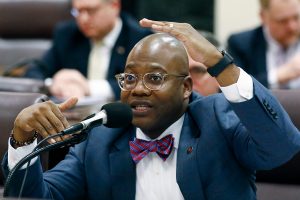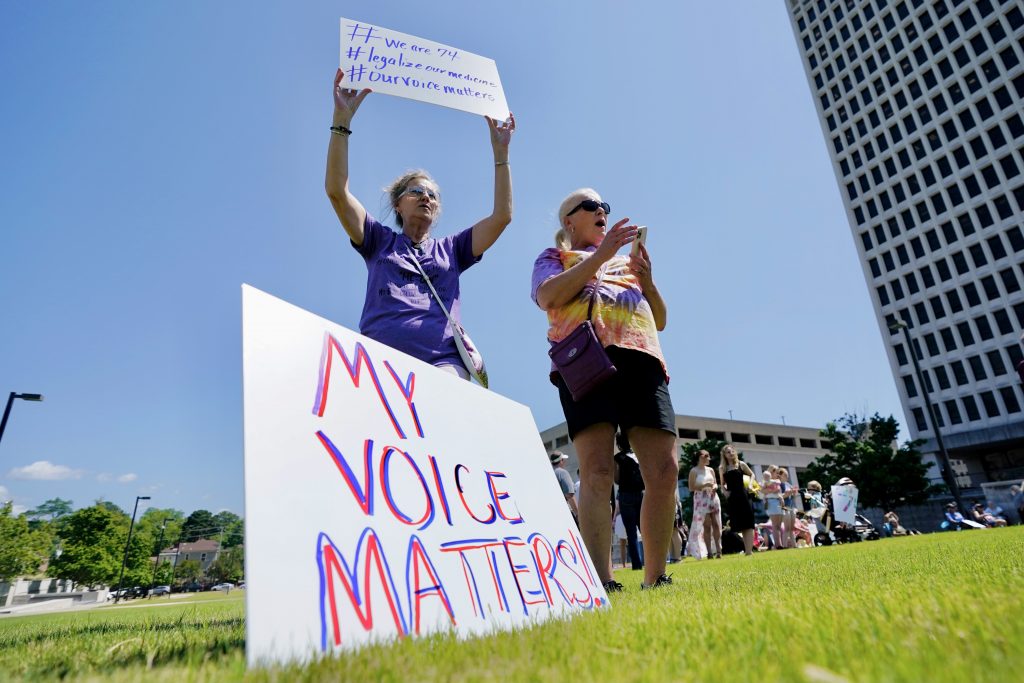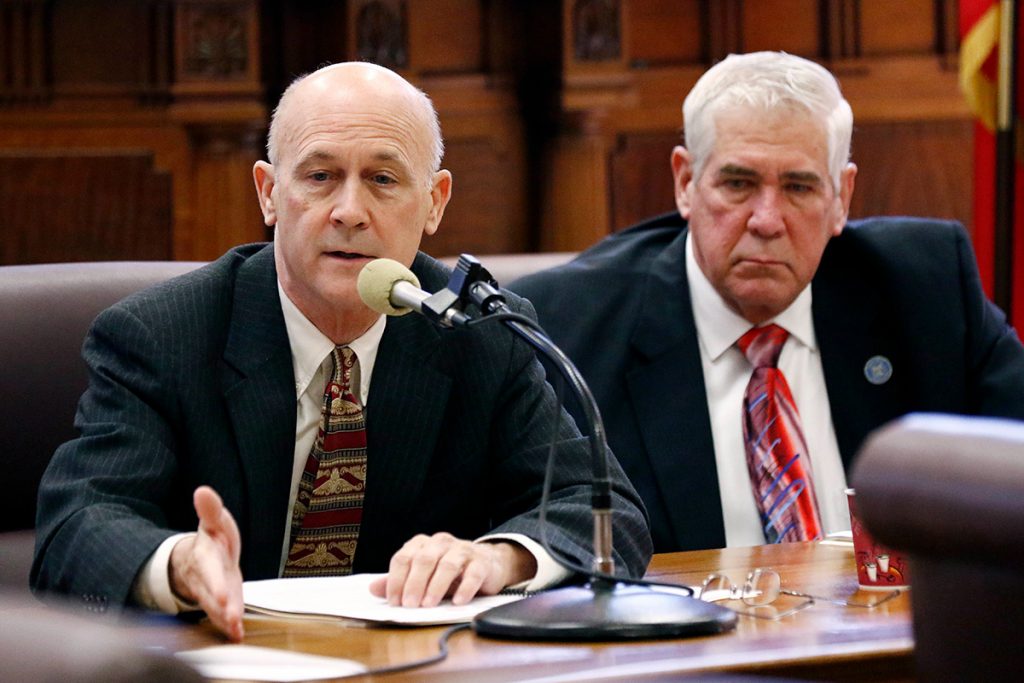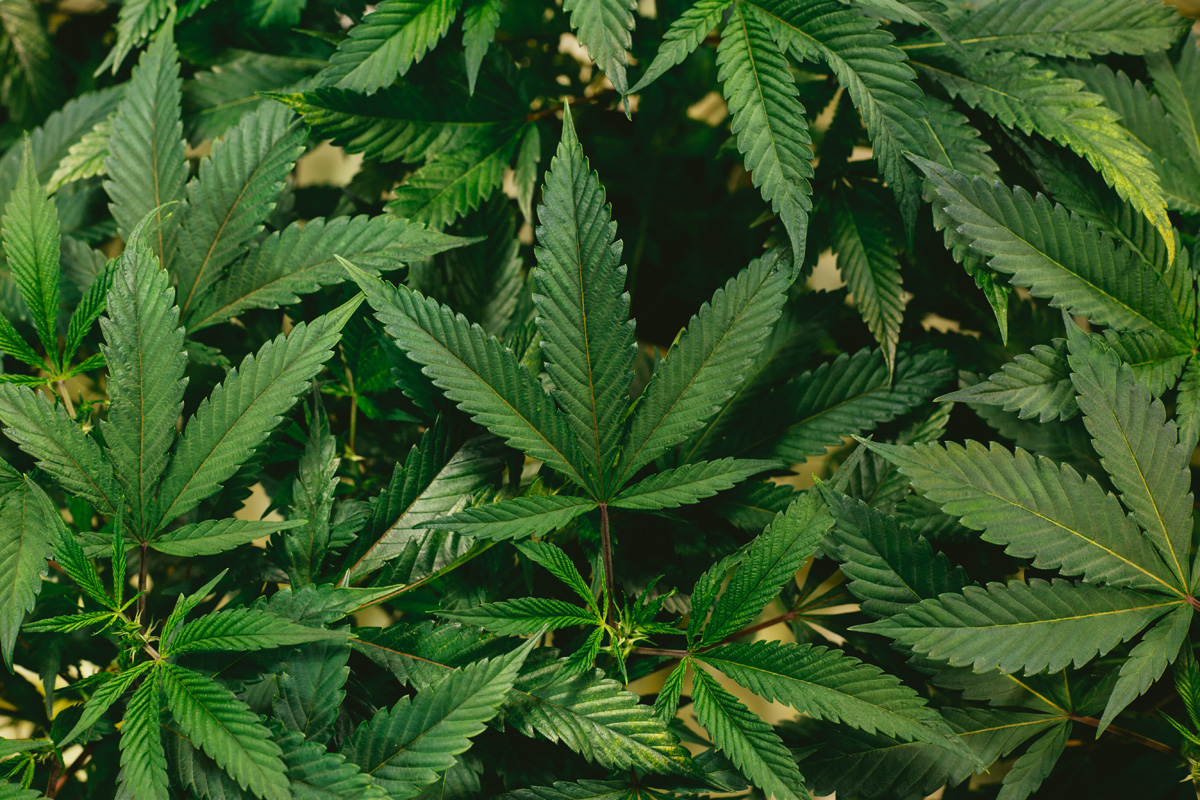As Sen. Kevin Blackwell took the chamber floor Thursday morning, the DeSoto County Republican began reciting the words of a Bob Dylan song: “Well, they’ll stone you when you’re trying to be so good. They’ll stone you just like they said they would. They’ll stone you when you’re walking on the street. They’ll stone you when you’re trying to keep your seat.”
He was introducing Senate Bill 2095, the Mississippi Medical Cannabis Act, which his fellow senators would pass later that afternoon in a 47-to-5 vote despite Gov. Tate Reeves’ threats to veto the bill. It would allow patients to receive up to 3.5 ounces a month for treatment for 28 qualifying illnesses.
Lawmakers drafted the legislation after the Mississippi Supreme Court struck down Initiative 65, a medical-marijuana program that voted overwhelmingly approved in 2020. If the bill becomes law, patients must obtain a diagnosis and a medical-marijuana card in order to become eligible for treatment. Medical marijuana would be taxed at the point of sale with the state’s 7% sales tax and with an additional 5% excise tax.
Despite strict regulations on who can obtain medical marijuana, the governor has described the bill as “recreational” and demanded greater quantity limits.
During his remarks on the Senate floor, Blackwell took aim at Reeves and other opponents after reading more of Dylan’s lyrics to “Rainy Day #12 and 35”: “They’ll stone you when you’re tryin’ to make a buck. Then they’ll stone you and then they’ll say ‘good luck.’ Tell you what, I would not feel so alone. Everybody must get stoned.”
“What’s the significance of these lyrics in relation to this bill? It’s to draw attention to the almost hysterical, paranoid, reefer madness, chicken little belief expressed by a few skeptics that if we pass a medical cannabis bill that the streets of Mississippi will be flooded by pot smoking zombies, crime will explode, planes will fall from the sky and the world as we know it will simply come to an end,” Blackwell explained. “Some of you may share those illogical beliefs but they are simply not true.”
In December, Reeves said that, as a father of three daughters, the medical-marijuana program concerned him. He claimed that the 3.5 ounces allowed under the legislation was the equivalent of allowing “11 joints a day.”
While on the Senate floor Thursday, though, Blackwell passed around a small bag of hemp to fellow lawmakers to demonstrate what 3.5 ounces of marijuana looks like.
“There’s been talk that this is 11 joints—that people will be getting 11 joints. No. This will make about 3 ½ joints a day,” he said. “… It’s been said on the radio that an ounce is the size of a loaf of bread. I don’t know where you get your bread at—that might be a slice, but it’s not a loaf.”
No Outdoor Farming Or Expungement Waivers
Several senators who ultimately voted for the bill nonetheless raised concerns about certain provisions. Sen. Chris McDaniel, R-Ellisville, noted that the legislation taxes medical marijuana with the regular 7% sales tax in addition to a 5% excise tax like the tax on alcohol, which is often referred to as a “sin tax.”
“I think most Mississippians would agree that it isn’t a sin to use marijuana for medicinal purposes,” McDaniel said. “Why would we want to raise the cost of their medicine? It seems to me in an impoverished state like ours we would want to make it easier, not more difficult, to get medicine.”
Blackwell said he did “not see the 5%” affecting affordability. He said the excise tax’s inclusion was in recognition of the fact that marijuana remains an illegal, Schedule I drug under federal law.

“Somewhere probably in the not too distant future, the feds are going to remove this from Schedule I and when it drops to Schedule II, I think we’d like to see a move to eliminate that tax,” he said.
Sen. Barbara Blackmon, D-Jackson, proposed an amendment to the bill that would have allowed farmers to grow marijuana outdoors. Under the bill, any marijuana producers must grow it indoors.
“We should allow our farmers the opportunity to take advantage of this new cash crop. … Why would we take it from them and give it to some outside corporations to benefit from these new cash crops?” she asked.
Blackwell said he and other lawmakers decided to limit it to indoor growing based on problems Oklahoma faced when it implemented a medical-marijuana program that allowed outdoor growing.
“They had thousands of outdoor licenses. But take a look at just the additional cost to supervise all of these additional farms, not to mention the concerns about pesticides, insecticides, fungus and other contaminants, and wind drift of other seeds being grown. I think we’ve got it set up so our growth will be controlled.”
Blackmon’s amendment failed.
Expunging Records Not Included
Sen. Derrick Simmons, D-Greenville, also proposed an amendment that would make it easier for people with past marijuana possession convictions to expunge their records. Under current law, they would have to wait five years after their conviction in order to request an expungement. That burden, he noted, falls heavily on poor Mississippians and Black Mississippians.
The Democratic senator’s amendment would have granted some people with a past conviction involving a now legalized amount of marijuana the opportunity to immediately seek expungement with waiting five years. The waiver would only have applied to those who, under the new medical-marijuana program, are able to obtain a medical-marijuana card.
One Republican, McDaniel, said he believed the amendment sounded reasonable. But Sen. David Parker, R-Olive Branch, expressed caution, saying that just because someone has a qualifying medical condition now does not mean they had one when they illegally used marijuana in the past.
Blackwell acknowledged the racial disparities inherent in marijuana prosecutions, pointing to former President Richard Nixon’s War on Drugs and his preoccupation with targeting Black civil-rights activists and hippies who opposed the Vietnam War. Still, he asked fellow lawmakers to vote against the amendment for now, saying it would be an issue worth revisiting with more due diligence. The Senate killed Simmons’ amendment.

Sen. Angela Hill, R-Picayune, also offered an amendment that would have drastically overhauled the entire bill, prohibiting the smoking of medical marijuana while allowing pills, lotions, oils and other suppositories.
“It does not allow combustible cannabis, because never in my 56 years have I ever seen anyone call combustible smoking medicine,” she said.
Her amendment would have eliminated limits on the total amount of medical-marijuana patients could receive while allowing patients to receive the medicine from pharmacies rather than marijuana dispensaries. Her proposal would have also allowed Mississippi universities first right of refusal to manufacture marijuana medication.
“I’m almost overwhelmed, and I don’t really know how to respond to this,” Blackwell said after Hill finished her remarks. “But if you want to kill the medical cannabis program, I encourage you to vote for Senator Hill’s amendment.”
The amendment failed, with only six members backing Hill’s proposals.
Sen. Blackmon then returned to the floor where she attempted to offer an additional amendment.
“It provides that, in issuing licenses to all medical cannabis establishments and any other actions taken by the department, that we are going to pursue a comprehensive approach to advancing equity for all, including people of color and others who have been historically underserved, marginalized and adversely affected by poverty and inequality,” she said.
Blackmon noted that Mississippi is one of the most dependent states on federal money. With more efforts targeting equity in Mississippi, where almost 40% of the population is Black, she said, the state could become more fiscally independent.
“We send up to Washington $1, we get back from Washington $3.40 because of the disparities that are in this state,” said Blackmon, who is Black. “Aren’t y’all tired of getting that yankee money? Y’all don’t want that money coming to Mississippi from New York, Connecticut, Rhode Island. We don’t want that liberal, Hollywood money coming to Mississippi. We want to lift up our businesses, our people.”
But Blackwell once again asked senators to reject the amendment, saying the bill does “not have any limitation on any of these licenses” and that “anybody can apply for a license.” A majority rejected the amendment.
‘The Devil’s Cabbage’
Before the vote, Sen. Chad McMahan, R-Guntown, delivered a speech hearkening back to the Legislature’s past.
“My friends, I had not intended to discuss this controversial subject at this particular time. However, I want you to know that I do not shun controversy. On the contrary, I will take a stand on any issue at any time no matter how fraught it is with controversy,” he began. “You have asked me how I feel about marijuana. Alright, I’ll tell you how I feel about marijuana.”
McMahan was modeling his words on the famous “Whiskey Speech” that Mississippi House Rep. Noah “Soggy” Sweat delivered on the floor in April 1952 while speaking against alcohol prohibition.

“If when you say marijuana,” McMahan continued on Thursday, “you mean the devil’s cabbage, the poisonous smoke, the green monster that defiles innocence, dethrones reason, destroys the home, creates misery and poverty, yea literally takes the bread out of little mouths of children; if you mean the corrupt weed that topples the Christian man and woman from the pinnacle of and gracious living into the bottomless pit of degradation, despair, shame and helplessness, then I am certainly against it.”
“But if when you say marijuana, you mean the smoke of conversation, the philosophic stimulant, the flower that is consumed when good friends get together and put a song in their heart and laughter on their lips and the warm glow of contentment; if you mean holiday cheer, if you mean the drug that will bring pain relief and puts a spring in the old crippled bodies paralyzed with stiffness;
“If you mean the plant which enables a person to magnify their joy, if only for a little while, and to forget if only for a little while, life’s greatest triages, sorrows and heartaches; if you mean the potential row crop which could pour into our treasuries untold millions of dollars which could be used to provide for the care of our little children, our blind, our deaf and our infirm; to build highways and hospitals and schools, then I am certainly for it. This is my stand and I will not retreat from it.”
Patients With 28 Conditions Eligible
The Initiative 65 program that voters approved in 2020 would have allowed up to 5 ounces of marijuana to treat almost two dozen specific medical conditions. The current bill would allow up to 3.5 ounces for the treatment of those same conditions and also adds hepatits, alzheimer’s disease and spastic quadriplegia.

The full list of conditions for which the bill allows a patient to obtain a medical-marijuana card include:
- Alzheimer’s disease
- Parkinson’s disease
- Huntington’s disease
- muscular dystrophy
- Glaucoma
- Hepatitis
- Spastic Quadriplegia
- HIV
- AIDS
- amyotrophic lateral sclerosis
- Crohn’s disease
- ulcerative colitis
- sickle-cell anemia
- agitation of dementia
- post-traumatic stress disorder
- Autism
- pain refractory to appropriate opioid management
- diabetic/peripheral neuropathy
- spinal cord disease or severe injury
- A chronic, terminal or debilitating disease or medical condition that produces one or more of the following: cachexia or wasting syndrome, chronic pain, severe or intractable nausea or severe and persistent muscle spasms, including, but not limited to, those characteristic of multiple sclerosis
The bill will make it harder for people with conditions not specified in the list to obtain medical marijuana than Initiative 65 did, however. Initiative 65 permitted people with other conditions to receive medical marijuana for treatment as determined by their doctors. Under this legislation, however, any additional qualifying conditions must be added by the Mississippi Department of Health before patients can access cannabis treatment.
The bill must still earn approval in the Mississippi House of Representatives before it can reach the governor’s desk. Though Reeves has cited the safety of his daughters while threatening to veto the bill, lawmakers could override a gubernatorial veto with a two-thirds majority in both chambers.
CORRECTION: An earlier version of this story misspelled Sen. Chad McMahan’s last name as “McMann.” We apologize for this error.






